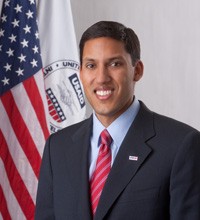From extreme droughts to historic storms, a lot has happened in the last decade to reshape the way we think about—and respond to—the impact of climate change, environmental degradation and resource scarcity. At the same time, we have watched global pressures increase as the world’s population jumped by a billion in just over a decade.
By 2050, the world will need to feed 9 billion people. That is a very stark number for a world where 780 million already lack access to clean water; 860 million people go to bed hungry every night; and more than 3 million children die each year from malnutrition.
Today, there is broad consensus that climate change is one of our century’s greatest challenges and addressing it will require the collective action of all of us: entrepreneurs and innovators, engineers and scientists, government ministers and community leaders.
Several weeks ago, the world’s leading CEOs gathered in the Roosevelt Room of the White House to discuss how consumer companies could reduce their impact on deforestation and climate change. The need for change is clear. Today, no challenge is more pressing or global than tropical deforestation—a threat not only to sustainable development, but also to the very planet that sustains us.
Every year, tropical deforestation accounts for 17 percent of global greenhouse gas pollution, and nearly half of this pollution can be traced back to just five commodity crops: palm oil, soy, paper, beef and timber. That means that everything from the steak you eat to the cleaning products you use contributes to the degradation of our tropical forests.
Together with more than 400 companies in the Consumer Goods Forum, we have helped create the Tropical Forest Alliance (TFA) to help end commodity-driven tropical deforestation by 2020. By harnessing the resources and expertise of the global corporate community, we can actually change the way that markets incentivize sustainable development.
Since the launch of TFA 2020 last year, we have been working around the world to scale up our partnerships and harness cutting-edge innovations in the fight to end tropical deforestation. In Indonesia, we’re working with Johnson & Johnson to map the company’s palm oil supply chains as the first step to potentially developing an innovative barcode system that can track whether a specific product has caused tropical deforestation.
Perhaps most exciting, these efforts are now supported by Global Forest Watch 2.0, a real-time geospatial tropical forest monitoring tool that we helped develop with the World Resources Institute. Every dollar that we have invested in this tool has leveraged more than $10 from private sector partners like Google and Staples.
In many ways, global public-private partnerships like TFA 2020 reflect the foundation of our new model of development. We know that the challenges we face—from climate change to extreme poverty—are solvable, but solving them requires a new emphasis on harnessing high-impact partnerships and game-changing innovations to deliver transformational results.
In Nepal, for example, we’re working with CARE and the World Wildlife Fund to launch an innovative payment scheme that rewards communities for a greater presence of wildlife in restored forests. This is a vital approach in a country where about 80 percent of people rely on natural resources to make a living.
Today, we have to recognize that sustainable development means more than delivering vaccines or building schools. And environmental protection means more than planting trees. Ultimately, in order to solve challenges like food insecurity or deforestation, we need to work effectively to both protect and manage the environment that supports us—the fertile farms, water basins and clean air that will sustain our growth and spur our prosperity for generations to come.










Comment
Make a general inquiry or suggest an improvement.